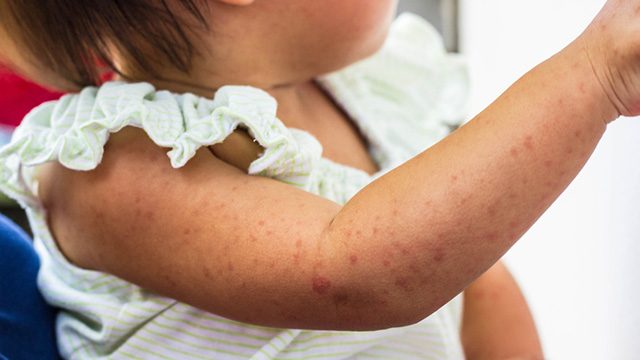SUMMARY
This is AI generated summarization, which may have errors. For context, always refer to the full article.

MANILA, Philippines – The Department of Health (DOH) has recorded 598 cases of measles from January 1 to March 17, a huge spike from the figures in the same period last year.
Health Secretary Francisco Duque III confirmed this to Rappler on Tuesday, April 3.
“We have 598 confirmed cases from January 1 to March 17, 2018. There are 12 deaths,” Duque said in a phone interview. (READ: FAST FACTS: What is measles, and how can it be prevented?)
Where the measles cases and deaths were recorded: The deaths were recorded in Davao Region, Soccsksargen, Central Luzon, and the National Capital Region (NCR).
Measles outbreaks were previously declared in Negros Oriental, a barangay in Taguig, Zamboanga City, Davao Region, and Davao City.
Central Luzon and NCR, along with Calabarzon, are also the regions where the DOH’s now-suspended dengue vaccination program for public school children was launched. (READ: TIMELINE: Dengue immunization program for public school students)
How do the 2018 figures compare with 2017 numbers? The measles figures this year significantly increased compared to 2017.
DOH data showed that there were 508 suspect cases of measles and rubella or German measles reported from January 1 to March 4, 2017, with 393 cases tested. Of the 393 cases, only 9 cases were classified as laboratory-confirmed measles while 107 cases are laboratory-confirmed rubella cases.
There were no deaths recorded between January to March 2017.
Why are measles cases increasing? Duque attributed the rising cases to panic triggered by the Dengvaxia scare. French pharmaceutical giant Sanofi Pasteur earlier admitted that people who got the dengue vaccine but had no prior infection with the virus can experience worse cases of dengue.
The government’s use of Dengvaxia in its dengue immunization program was the subject of congressional probes, where some parents attributed their children’s death to Dengvaxia.
Because of this, some parents are now scared to get their children vaccinated for other diseases that could be prevented through immunization programs. (READ: Duque to health workers: ‘Woo’ parents to avail of vaccination programs)
“The number one reason is still the fear that the Dengvaxia has generated, thereby eroding the trust in our other vaccines, innocent vaccines,” said Dique.
He also attributed the increase of cases in the Mindanao area to the tendency of people there to move from one place to another because of their livelihood, like fishing.
What is the DOH doing about it? Currently, DOH is employing its outbreak response immunization program to convince more people to get themselves vaccinated for measles.
Duque said supplemental immunization activities are also being conducted to achieve “herd immunity” status, where people who already have measles will be “walled off” from the rest of the population.
The DOH chief also urged parents to avail of free immunization programs for their children.
“That’s why we appeal to the parents that these measles vaccines are very safe and are quite protective of the infection that may have severe complications in unprotected, unvaccinated children,” said Duque. – Rappler.com
Add a comment
How does this make you feel?
There are no comments yet. Add your comment to start the conversation.